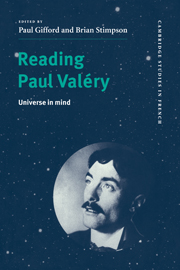Book contents
- Frontmatter
- Contents
- Contributors
- Abbreviations
- Introduction
- PART 1 SELF-SCIENCE
- PART 2 SELF-WRITINGS
- PART 3 BODY, MIND, WORLD
- 13 An aesthetics of the subject: music and the visual arts
- 14 Politics, history and the modern world
- 15 Valéry and the feminine
- 16 Dream and the unconscious
- 17 Self and other: Valéry's ‘lost object of desire’
- Conclusion
- Bibliography
- Index
- Cambridge Cultural Social Studies
17 - Self and other: Valéry's ‘lost object of desire’
Published online by Cambridge University Press: 04 August 2010
- Frontmatter
- Contents
- Contributors
- Abbreviations
- Introduction
- PART 1 SELF-SCIENCE
- PART 2 SELF-WRITINGS
- PART 3 BODY, MIND, WORLD
- 13 An aesthetics of the subject: music and the visual arts
- 14 Politics, history and the modern world
- 15 Valéry and the feminine
- 16 Dream and the unconscious
- 17 Self and other: Valéry's ‘lost object of desire’
- Conclusion
- Bibliography
- Index
- Cambridge Cultural Social Studies
Summary
The purpose of this last chapter is to explore something of the dynamic set of tensions at the heart of Valéry's self-science: the problematic relationship between Self and Other. Neither of these terms is unequivocal or transparent. We might say that the object of Valéry's lifelong quest is to possess clearly the sense of the first. The sense of the second term is variable (it is a category word): the ‘Other’ means the non-self insofar as it acquires importance for the self relationally, whether object or person, external to the subject's own universe of consciousness or, most interestingly, as we shall see, intrinsic to it (the self experienced as other).
In its purest form, Valéry's ‘self-science’ is a declaration of autonomy, a dismissal of other selves:
Mais moi, Narcisse aimé, je ne suis curieux
Que de ma seule essence;
Tout autre n'a pour moi qu'un coeur mystérieux,
Tout autre n'est qu'absence
(FN, ii. 231–4)The adventure of Valéry's Narcissus is dominated by the marvelling discovery of the mirroring power of human consciousness, taken as ‘source’ of identity and selfhood. When set beside the protagonist's central desire for self-apprehension, self-seizure and self-coincidence, the lovers' all-too-human dreams of a communion-in-alterity seem remote and irrelevant. The only interiority to which there is immediate access is one's own; the most immediate, the most perfectible, other-reciprocity available, therefore – or so it seems – is with oneself.
- Type
- Chapter
- Information
- Reading Paul ValéryUniverse in Mind, pp. 280 - 296Publisher: Cambridge University PressPrint publication year: 1999

